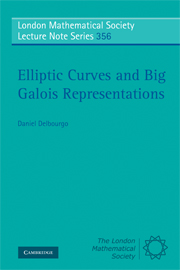Book contents
- Frontmatter
- Contents
- Introduction
- List of Notations
- Chapter I Background
- Chapter II p-Adic L-functions and Zeta Element
- Chapter III Cyclotomic Deformations of Modular Symbols
- Chapter IV A User's Guide to Hida Theory
- Chapter V Crystalline Weight Deformations
- Chapter VI Super Zeta-Elements
- Chapter VII Vertical and Half-Twisted Arithmetic
- Chapter VIII Diamond-Euler Characteristics: the Local Case
- Chapter IX Diamond-Euler Characteristics: the Global Case
- Chapter X Two-Variable Iwasawa Theory of Elliptic Curves
- Appendices
- Bibliography
- Index
Chapter III - Cyclotomic Deformations of Modular Symbols
Published online by Cambridge University Press: 04 May 2010
- Frontmatter
- Contents
- Introduction
- List of Notations
- Chapter I Background
- Chapter II p-Adic L-functions and Zeta Element
- Chapter III Cyclotomic Deformations of Modular Symbols
- Chapter IV A User's Guide to Hida Theory
- Chapter V Crystalline Weight Deformations
- Chapter VI Super Zeta-Elements
- Chapter VII Vertical and Half-Twisted Arithmetic
- Chapter VIII Diamond-Euler Characteristics: the Local Case
- Chapter IX Diamond-Euler Characteristics: the Global Case
- Chapter X Two-Variable Iwasawa Theory of Elliptic Curves
- Appendices
- Bibliography
- Index
Summary
The algebraic methods converting norm-compatible families into p-adic L-functions, have profound consequences in arithmetic. However, they also contain a number of unfortunate drawbacks. First of all, the cohomological zeta-elements satisfy some beautiful Euler system relations, yet these relations are lost once the zeta-elements have been converted into Iwasawa functions. Another disadvantage is the choice of periods occurring in the denominator of the interpolation is somewhat arbitrary. Whilst this isn't too much of a problem p-adically, in a two-variable setting it is potentially disastrous. The control theorems of Hida et al are phrased in terms of the parabolic cohomology, and ideally we would like to work with these objects, instead of cruder power series rings. These power series rings don't see the action of the Hecke algebra, and thus cannot satisfy multiplicity one-type results.
The first half of this book proposes a workable solution to each of these problems. Our approach is motivated by the simple observation that the Kato-Beilinson Euler system encodes L-values of a primitive eigenform, over all abelian extensions of the rationals. With a bit of care, one can utilise this huge amount of data to write down explicit symbols, which will then end up as elements inside Betti cohomology. All these notions generalise seamlessly to the setting of two-variable deformation theory. Furthermore, they permit the formulation of a Tamagawa Number Conjecture for the universal nearly-ordinary Galois representation (the second half of this book).
- Type
- Chapter
- Information
- Elliptic Curves and Big Galois Representations , pp. 50 - 69Publisher: Cambridge University PressPrint publication year: 2008



